

EXPLORE BY TOPIC:
  Our top 10 resources
Our top 10 resources
  Childhood / Early Life
Childhood / Early Life
  Chronic Stress
Chronic Stress
  Education
Education
  Food Security
Food Security
  Genetics
Genetics
  Jobs & Work
Jobs & Work
  Housing / Neighborhoods
Housing / Neighborhoods
  Income & Wealth
Income & Wealth
  Race / Racism
Race / Racism
  Social Inclusion
Social Inclusion
  Policy & Change
Policy & Change





Buy the DVD
e-Newsletter
FAQs
Contact Us
Site Map
Home

|
 |


 The Politics of Population Health The Politics of Population Health 
VIDEO PRESENTATION, Dennis Raphael, York University, January 20, 2006 This 45 minute lecture attempts to answer the question of why so little is done to address the social determinants of health when so much is known of their importance. Raphael posits that this inaction is largely due to the fact that the social determinants of health are themselves determined by policy decisions, and explores the politics behind these decisions. |
 |
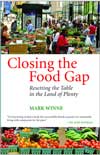 The Poor Get Diabetes, the Rich Get Local and Organic The Poor Get Diabetes, the Rich Get Local and Organic 
ARTICLE by Mark Winne In this excerpt from his new book, Closing the Food Gap: Resetting the Table in the Land of Plenty, Mark Winne explains a growing split in the diets of the haves and have-nots; at the same time that the wealthy are coming to prefer organic and locally-grown foods, the poor have been losing geographical and economic access to healthy options. He also reports on a survey by the non-profit group Hartford Food System, which found that low-income consumers in the area would prefer to purchase organics and fresh foods, but simply couldn't access or afford them. |
 |
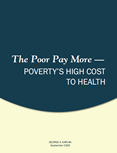 The Poor Pay More: Poverty's High Cost to Health The Poor Pay More: Poverty's High Cost to Health 
This report describes many of the ways in which being poor is bad for one’s health and points to policies that have the potential for restoring the prospect of good health to the lives of the poor. We present compelling evidence that poverty has an impact on not just the body politic but the body corporeal as well— that being poor leaves a broad footprint on the health of individuals. The health costs of poverty are high. Those among us who are poor tend to have
more illness and die younger. The report begins with descriptions of key determinants of health and the impact they have been shown to have on health. It then offers several policy options that might ease poverty and thereby improve health. |
 |
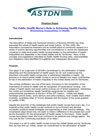 The Public Health Nurse's Role in Achieving Health Equity: Eliminating Inequalities in Health (pdf) The Public Health Nurse's Role in Achieving Health Equity: Eliminating Inequalities in Health (pdf) 
GUIDELINES from the Association of State and Territorial Directors of Nursing (ASTDN), 2008 This paper is an outgrowth of ASTDN’s commitment to the elimination of health disparities and the achievement of health equity for all, and underscores the important role public health nurses play in eliminating inequities in health. Its purpose is to inspire public health nurses to serve as leaders and major contributing forces in the elimination of health inequities in the United States and its Territories. |
 |
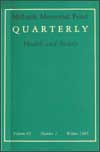 The Questionable Contribution of Medical Measures to the Decline of Mortality in the United States in the Twentieth Century The Questionable Contribution of Medical Measures to the Decline of Mortality in the United States in the Twentieth Century 
SCHOLARLY ARTICLE, The Milbank Memorial Fund Quarterly. Health and Society, 1977 This article makes the case that social reforms, not improvements in medical technology, have been largely responsible for the major improvements in population health over the past century. "Legislators, practitioners, and the public may deem it "heretical," but analysis of United States data shows that introduction of specific medical measures and expansion of services account for only a fraction of the decline in mortality since 1900. Even acknowledging that "mortality" and "health" are not synonymous, analysis of age- and sex-adjusted rates still suggests important trends and generates hypotheses for informed social action."
Available online by JSTOR subscription or purchase only. |
 |
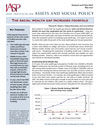 The Racial Wealth Gap Increases Four-Fold The Racial Wealth Gap Increases Four-Fold 
Thomas M. Shapiro, Tatjana Meschede,and Laura Sullivan Assessing the wealth holdings of the same families for 23 years (1984-2007) shows that the wealth gap between whites and African Americans increased more than 4 times, from $20,000 in 1984 to $95,000 in 2003. This gap persisted for African Americans and white families in the same income range. For example, middle-income white households had greater gains in financial assets than high-income African Americans; by 2007, they had accumulated $74,000, whereas the average high-income African American family owned only $18,000. At least 25% of all African American families had no assets to turn to in times of economic hardship. |
 |
 The Relationship of Adverse Childhood Experiences to Adult Medical Disease, Psychiatric Disorders, and Sexual Behavior: Implications for Healthcare The Relationship of Adverse Childhood Experiences to Adult Medical Disease, Psychiatric Disorders, and Sexual Behavior: Implications for Healthcare 
Vincent J. Felitti, MD and Robert F. Anda, MD, MS The focus of this chapter will be an examination of the relationship between traumatic stress in childhood and the leading causes of morbidity, mortality, and disability in the United States: cardiovascular disease, chronic lung disease, chronic liver disease, depression and other forms of mental illness, obesity, smoking, and alcohol and drug abuse. To do this, the authors will draw on their experience with the Adverse Childhood Experiences (ACE) Study, a major American epidemiological study providing retrospective and prospective analysis in over 17,000 individuals of the effect of traumatic experiences during the first eighteen years of life on adolescent and adult medical and psychiatric disease, sexual behavior, healthcare costs, and life expectancy.4 |
 |
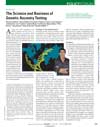 The Science and Business of Genetic Ancestry Testing The Science and Business of Genetic Ancestry Testing 
ARTICLE in the Policy Forum section of Science, October 19, 2007 This article, co-authored by 14 highly respected geneticists, sociologists, and anthropologists, presents some of the unintended consequences of the boom in genetic ancestry testing. They explain how these tests "have significant scientific limitations" yet may be "serious matters for many test-takers." |
 |
 The Science and Epidemiology of Racism and Health in the United States: an Ecosocial Perspective The Science and Epidemiology of Racism and Health in the United States: an Ecosocial Perspective 
VIDEO PRESENTATION, Nancy Krieger, February 29, 2008
In her keynote lecture to the 29th Annual Minority Health Conference, Dr. Krieger explores how racism harms health and creates the very categories of "race." The idea that racial/ethnic health inequities are a biological expression of racism, that their origins lie in injustice, not biology, is not an ideological argument but a scientific statement that rests on rigorous scientific testing. Using ecosocial theory, Krieger explains the myriad ways racial inequality becomes biologically embodied over the lifecourse and across generations, through pathways including adverse exposure to: economic and social deprivation; toxic substances, pathogens, and hazardous conditions; social trauma; targeted marketing of harmful commodities; and inadequate and degrading medical care. In this presentation, Krieger discusses conceptual and methodological aspects of analyzing how racial and economic injustice produce health inequities, coupled with empirical examples drawn from her own research as a social epidemiologist. |
 |
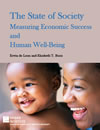 The State of Society: Measuring Economic Success and Human Well-Being The State of Society: Measuring Economic Success and Human Well-Being 
Erwin de Leon and Elizabeth T. Boris In this study, the authors provide an overview of a broad range of existing measures that go beyond gross domestic product (GDP) to offer a more complete and accurate picture of how a society and its economy are faring. Particular attention is given to data still generally marginalized on the economic and social status of the majority of every society—women and children—and to how this correlates with both a nation’s quality of life and its economic success. Based on a review of the literature and an analysis of major arguments and rationales for moving beyond GDP as a measure of national well-being, this report identifies 14 categories of national well-being. It synthesizes hundreds of indicators found in 28 reports1 that present alternative indices and systems of well-being into 79 indicators. |
 |
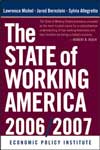 The State of Working America 2006/2007 The State of Working America 2006/2007 
REPORT by Mishel, Bernstein, and Allegretto, Cornell University Press and the Economic Policy Institute, 2007 Prepared biennially since 1988, EPI's flagship publication sums up the problems and challenges facing American working families, presenting a wide variety of data on family incomes, taxes, wages, unemployment, wealth, and poverty — data that enables the book's authors to closely examine the impact of the economy on the living standards of the American people. The State of Working America 2006/2007 is an exhaustive reference work that will be welcomed by anyone eager for a comprehensive portrait of the economic well-being of the nation. |
 |
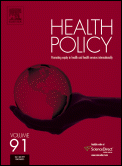 The state's role in promoting population health: Public health concerns in Canada, USA, UK, and Sweden The state's role in promoting population health: Public health concerns in Canada, USA, UK, and Sweden 
SCHOLARLY ARTICLE by Dennis Raphael, Health Policy, August 2006 In this paper we examine the dominant public health models of Canada, USA, UK, and Sweden and argue that the extent to which governments, public health agencies and public health workers use public policy to address broader determinants of health depends upon the model of health adhered to within each jurisdiction. And whether a health model is adopted depends upon the ideological and political context within which a nation is situated.
replicas de relojes suizos |
 |
 The Story of Stuff The Story of Stuff 
VIDEO and WEBSITE by Annie Leonard This entertaining and often surprising 20 minute video explains in easy language how "stuff" is produced, distributed, sold, and disposed of - and why the current system is in crisis. The Web site then offers tips for what you can do to help change the destructive chain, and inspiration for how to get involved in a wide variety of possible ways.
Functional exact Swiss Replica Rolex Watches UK on amazon with high quality for men - Rolex, TAG Heuer and Breitling.
Buying luxury replica watches ca with both low price and high quality at our online store. |
 |
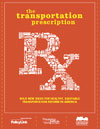 The Transportation Prescription: Bold New Ideas for Healthy, Equitable Transportation Reform in America (pdf) The Transportation Prescription: Bold New Ideas for Healthy, Equitable Transportation Reform in America (pdf) 
REPORT from PolicyLink, Prevention Institute, and the Convergence Partnership, 2009
This report synthesizes the insights and recommendations of a group of leading academic researchers and advocates working at the panerai replica intersection of transportation policy, equity, and public health identify opportunities for creating transportation systems that promote health and equity.
|
 |
 The U.S. and the Marshall Islands The U.S. and the Marshall Islands 
ARTICLE by Bernice Powell Jackson, Commission for Racial Justice Rev. Dr. Jackson, executive director of the UCC Commission for Racial Justice, presents the history of the U.S. relationship to the Marshall Islands and makes a case for our continuing obligation to Marshallese citizens.replica uhren |
 |
 The Wealth Factor The Wealth Factor 
ARTICLE by Dalton Conley, New York University What difference does wealth make in terms of your life opportunities? Over recent years, magazines and newspapers have run a variety of articles that explore why middle-class Black children don't do as well in school as white children from families with similar socio-economic backgrounds. These "achievement gap" articles are based on studies that relate achievement to family incomes. But the findings from these studies, argues one researcher, are highly misleading--because they simply fail to factor in what may be the key determinant to socio-economic status: family wealth. |
 |
 The Work, Family, and Equity Index: How Does the United States Measure Up? The Work, Family, and Equity Index: How Does the United States Measure Up? 
REPORT by The Project on Global Working Families, 2007 The Work, Family, and Equity Index has been developed to measure governmental performance around the world in meeting the needs of working families in general and and low- and middle-income working families in particular. The policies used to comprise the index have achieved widespread recognition based on the weight of the research evidence or consensus in global policy and international agreements. |
 |
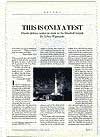 This is Only a Test: Missile defense makes its mark in the Marshall Islands This is Only a Test: Missile defense makes its mark in the Marshall Islands 
ARTICLE by JoAnn Wypijewski in Harpers, December 2001 Wypijewski discusses the the history and current status of the U.S. military presence in the Marshall Islands.
Full text available only to subscribers. |
 |
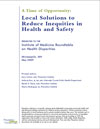 Time of Opportunity: Local Solutions to Prevent Inequities in Health and Safety (pdf) Time of Opportunity: Local Solutions to Prevent Inequities in Health and Safety (pdf) 
REPORT by Dr. Anthony Iton of the Alameda County Public Health Department and Larry Cohen, Rachel A. Davis and Sharon Rodriguez of Prevention Institute This 2009 report prepared for presentation to the Institute of Medicine Roundtable on Health Disparities presents 32 recommendations for strengthening communities, improving quality health care access, developing our health system, and supporting local efforts.
|
 |
 Too Young to Die: Part 1, Life's Toll Too Young to Die: Part 1, Life's Toll 
NEWS ARTICLE, San Francisco Chronicle, October 2004 In Bayview-Hunters Point, the stress created by environmental problems, racism, poverty and crime may explain why so many babies die young. Infant mortality is twice as high here as in the rest of San Francisco.
|
 |
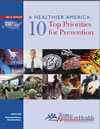 Top Ten Priorities for Prevention Top Ten Priorities for Prevention 
ISSUE REPORT, Trust for America's Health TFAH has identified 10 key policy areas where government action could improve the health of the U.S. population and lower the costs associated with treating people after they're already sick:
- Promoting Disease Prevention
- Combating the Obesity Epidemic
- Preventing Tobacco Use and Exposure
- Preventing and Controlling Infectious Diseases
- Preparing for Potential Health Emergencies and Bioterrorism Attacks
- Recognizing the Relationship Between Health and U.S. Economic Competitiveness
- Safeguarding the Nation's Food Supply
- Planning for Changing Health Care Needs of Seniors
- Improving the Health of Low-Income and Minority Communities
- Reducing Environmental Threats fake ysl
And a crosscutting recommendation for:
- Holding Government Accountable for Protecting the Health of Americans
|
 |
 Toppling the 'Big Three' -- Medical Care, Behavior, and Genes Toppling the 'Big Three' -- Medical Care, Behavior, and Genes 
NEWS ARTICLE, Madeline Drexler, Nieman Reports, Spring 2009 Madeline Drexler's article, published in the quarterly magazine of Harvard's Nieman School of Journalism, Nieman Reports, about the under-reported importance of the social determinants of health equity and production of the UNNATURAL CAUSES series.
The Spring 2009 issue overall (21st Century Muckrakers: Investigating Medical and Health Issues) includes several other great articles on health and medical reporting: http://www.nieman.harvard.edu/reports.aspx |
 |
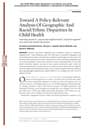 Toward A Policy-Relevant Analysis Of Geographic And Racial/Ethnic Disparities In Child Health Toward A Policy-Relevant Analysis Of Geographic And Racial/Ethnic Disparities In Child Health 
SCHOLARLY ARTICLE by Acevedo-Garcia, Osypuk, McArdle and Williams, 2008 Extreme racial/ethnic disparities exist in children’s access to "opportunity neighborhoods." We need to move beyond conventional public health and health care approaches to consider policies to improve access to opportunity-rich neighborhoods through enhanced housing mobility, and to increase the opportunities for healthy living in disadvantaged neighborhoods. |
 |
 Toxic Wastes and Race Revisited (pdf) Toxic Wastes and Race Revisited (pdf) 
REPORT by Benjamin A. Goldman and Laura J. Fitton, 1994 An update on the 1987 report on the racial and socioeconomic characteristics of communities with hazardous waste sites. Co-sponsored by Center for Policy Alternatives, NAACP, and United Church of Christ Commission for Racial Justice |
 |
 Trouble in Paradise Trouble in Paradise 
ARTICLE by Christopher Reuther, Environmental Health Perspectives
Overview of the environmental health threats to the Pacific Islands, including Hawaii and other U.S.-associated islands. |
 |
| « Prev 1 | 2 | 3 | 4 | 5 | 6 | 7 | 8 | 9 | 10 | 11 | 12 Next » |
|




